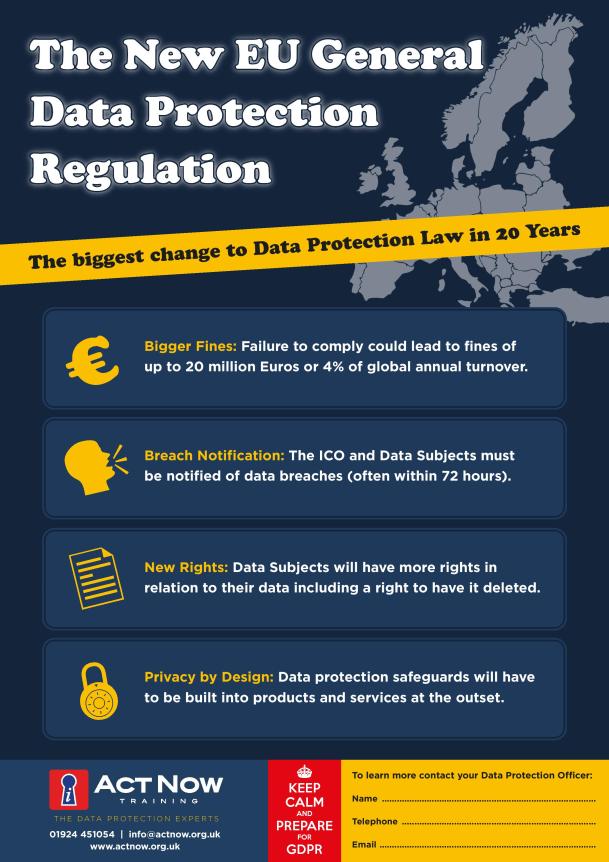 According to the new Prime Minister “Brexit means Brexit.” But what does Brexit mean for UK Data Controllers who are planning for implementation of the new General Data Protection Regulation (GDPR)? The short answer is keep calm and carry on.
According to the new Prime Minister “Brexit means Brexit.” But what does Brexit mean for UK Data Controllers who are planning for implementation of the new General Data Protection Regulation (GDPR)? The short answer is keep calm and carry on.
GDPR received formal adoption by the European Parliament in April 2016 and was published on 4th May in the Official Journal. This means that it will be directly applicable throughout EU member states (without the need for implementing legislation) from 25th May 2018. Following the referendum result, you might be forgiven for thinking that you can shred your copy of the Regulation or indeed cancel your place on our very popular GDPR workshop.
The UK may have voted to leave the EU but formal divorce proceedings cannot begin until it notifies the EU of its intention to invoke Article 50 of the Lisbon Treaty. This gives negotiators two years from the date of notification to conclude new arrangements. The newly appointed Secretary of State for Exiting the European Union, David Davis, has said Article 50 should be “triggered before or by the beginning of next year.” Therefore the UK could leave the EU by December 2018 at the earliest. Consequently there would be at least six months where UK Data Controllers would have to abide by all the provisions of GDPR. In reality exiting the EU could take much longer than two years and so we could be stuck with GDPR for much longer.
In the unlikely event that Brexit negotiations are concluded before May 2018, the DPA is still living on borrowed time. Immediately after the Brexit vote the Information Commissioner’s Office (ICO), released a statement saying:
“If the UK wants to trade with the Single Market on equal terms we would have to prove ‘adequacy’—in other words UK data protection standards would have to be equivalent to the EU’s General Data Protection Regulation framework starting in 2018.”
In a speech on 4th July 2016 the then Minister for Data Protection, Baroness Neville-Rolfe, touched on the future of data protection: (HT Panopticon Blog)
“One thing we can say with reasonable confidence is that if any country wishes to share data with EU Member States, or for it to handle EU citizens’ data, they will need to be assessed as providing an adequate level of data protection. This will be a major consideration in the UK’s negotiations going forward….”
The law firm, Bird and Bird, have set out the options available to the UK in terms of exiting the EU and its implications for data protection. Each of these options makes it likely that either the GDPR or a very close cousin will be required in the UK after Brexit takes effect.
Regardless of what data protection path the UK chooses, UK companies with European customers and operations have to continue with preparations. This is because GDPR will apply to any entity offering goods or services (regardless of payment being taken) and any entity monitoring the behaviours of citizens residing within the EU. Companies will be directly responsible for GDPR compliance wherever they are based (and not just their EU based offices) as long as they are processing EU citizens’ personal data.
Recently on the ICO’s Blog, the message was reiterated that GDPR is still relevant and preparation must continue:
“We’ve been working hard on producing a set of guidance on GDPR, with an overview of the law being the first substantive part of that. We still think it will be useful to publish this overview. This is because once implemented in the EU, the GDPR will be relevant for many organisations in the UK – most obviously those operating internationally. The other main reason is that the GDPR has several new features – for example breach notification and data portability. Therefore, we thought it would still be useful to familiarise information rights professionals with the GDPR’s main principles and concepts.”
Data Controllers have two years to prepare for the biggest change to the EU data protection regime in 20 years. Many provisions such as breach notification and the new DP Principles will require careful planning. With some GDPR breaches carrying fines of up to 4% of global annual turnover or 20 million Euros, a “wait and see” approach would be very risky.
How Act Now can help
The next two years need to be spent wisely. Training and awareness (see our poster) at all levels needs to start now. We are running a series of GDPR webinars and workshops and our team of experts is available to come to your organisation to deliver customised data protection/GDPR workshops as well as to carry out health checks and audits. GDPR requires many Data Controllers to appoint a dedicated Data Protection Officer. Our GDPR Practitioner Certificate, with an emphasis on the practical skills requited to implement GDPR, is an ideal qualification for those aspiring for such positions.
And if you like our image, it, as well as some others are available as A3 Posters for the office for only £5 for three! Take a look at the link below.
http://www.actnow.org.uk/posters
The GDPR Practitioner Certificate (GDPR.Cert) is aimed at those undertaking the role of Data Protection Officer under GDPR whether in the public or the private sector.

10 thoughts on “Data Protection Reform after Brexit. Does GDPR still matter?”